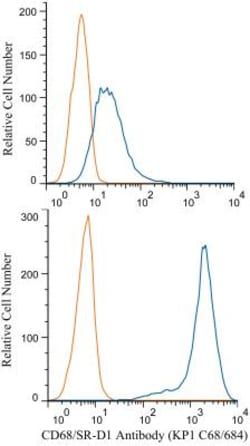CD68/SR-D1 Antibody (KP1 + C68/684), Biotin, Novus Biologicals™
Manufacturer: Novus Biologicals
Select a Size
| Pack Size | SKU | Availability | Price |
|---|---|---|---|
| Each of 1 | NBP234662B-Each-of-1 | In Stock | ₹ 57,494.00 |
NBP234662B - Each of 1
In Stock
Quantity
1
Base Price: ₹ 57,494.00
GST (18%): ₹ 10,348.92
Total Price: ₹ 67,842.92
Antigen
CD68/SR-D1
Classification
Monoclonal
Conjugate
Biotin
Gene Alias
CD68 antigenmacrophage antigen CD68, CD68 molecule, DKFZp686M18236, GP110, macrosialin, SCARD1, scavenger receptor class D, member 1
Host Species
Mouse
Molecular Weight of Antigen
110 kDa
Quantity
0.1 mL
Research Discipline
Cell Biology, Cytokine Research, Immunology, Microglia Markers
Gene ID (Entrez)
968
Target Species
Human, Feline, Primate, Rat (Negative)
Form
Purified
Applications
Western Blot, Flow Cytometry, Immunohistochemistry, Immunocytochemistry, Immunofluorescence, Immunohistochemistry (Paraffin), Immunohistochemistry (Frozen)
Clone
KP1 + C68/684
Dilution
Western Blot, Flow Cytometry, Immunohistochemistry, Immunocytochemistry/Immunofluorescence, Immunohistochemistry-Paraffin, Immunohistochemistry-Frozen, Flow (Intracellular)
Gene Symbols
CD68
Immunogen
This CD68/SR-D1 Antibody (KP1 + C68/684) was developed against subcellular fraction of human alveolar macrophages (KP1); Recombinant human CD68 protein (C68/684).
Purification Method
Protein A or G purified
Regulatory Status
RUO
Primary or Secondary
Primary
Test Specificity
This antibody recognizes a glycoprotein of 110kDa, which is identified as CD68. It is important for identifying macrophages in tissue sections. It stains macrophages in a wide variety of human tissues, including Kupffer cells and macrophages in the red pulp of the spleen, in lamina propria of the gut, in lung alveoli, and in bone marrow. It reacts with myeloid precursors and peripheral blood granulocytes. It also reacts with plasmacytoid T cells, which are supposed to be of monocyte/macrophage origin. It shows strong granular cytoplasmic staining of chronic and acute myeloid leukemia and also reacts with rare cases of true histiocytic neoplasia. Lymphomas are negative or show few granules.
Content And Storage
Store at 4C in the dark.
Isotype
IgG1 κ
Description
- CD68/SR-D1 Monoclonal specifically detects CD68/SR-D1 in Human, Mouse, Rat, Feline, Monkey samples
- It is validated for Flow Cytometry, Immunohistochemistry, Immunohistochemistry-Paraffin, Flow (Intracellular).

